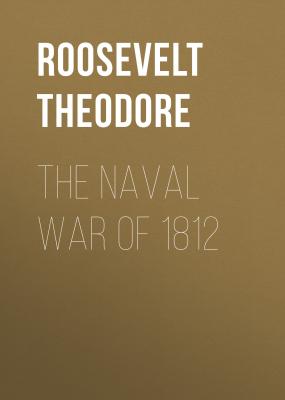ТОП просматриваемых книг сайта:
The Naval War of 1812. Roosevelt Theodore
Читать онлайн.Название The Naval War of 1812
Год выпуска 0
isbn
Автор произведения Roosevelt Theodore
Жанр История
Издательство Public Domain
The characteristics of the action are the practical equality of the contestants in point of force and the enormous disparity in the damage each suffered; numerically, the Wasp was superior by 5 per cent., and inflicted a ninefold greater loss.
Captain Jones was not destined to bring his prize into port, for a few hours afterward the Poictiers, a British 74, Captain John Poer Beresford, hove in sight. Now appeared the value of the Frolic's desperate defence; if she could not prevent herself from being captured, she had at least ensured her own recapture, and also the capture of the foe. When the Wasp shook out her sails they were found to be cut into ribbons aloft, and she could not make off with sufficient speed. As the Poictiers passed the Frolic, rolling like a log in the water, she threw a shot over her, and soon overtook the Wasp. Both vessels were carried into Bermuda. Captain Whinyates was again put in command of the Frolic. Captain Jones and his men were soon exchanged; 25,000 dollars prize-money was voted them by Congress, and Captain and Lieutenant Biddle were both promoted, the former receiving the captured ship Macedonian. Unluckily the blockade was too close for him to succeed in getting out during the remainder of the war.
On Oct. 8th Commodore Rodgers left Boston on his second cruise, with the President, United States, Congress, and Argus, [Footnote: Letter of Commodore Rodgers. Jan. 1. 1813.] leaving the Hornet in port. Four days out, the United States and Argus separated, while the remaining two frigates continued their cruise together. The Argus, [Footnote: Letter of Capt. Arthur Sinclair, Jan. 4, 1813.] Captain Sinclair, cruised to the eastward, making prizes of 6 valuable merchant-men, and returned to port on January 3d. During the cruise she was chased for three days and three nights (the latter being moonlight) by a British squadron, and was obliged to cut away her boats and anchors and start some of her water. But she saved her guns, and was so cleverly handled that during the chase she actually succeeded in taking and manning a prize, though the enemy got near enough to open fire as the vessels separated. Before relating what befell the United States, we shall bring Commodore Rodgers' cruise to an end.
On Oct. 10th the Commodore chased, but failed to overtake, the British frigate Nymphe, 38, Captain Epworth. On the 18th, off the great Bank of Newfoundland, he captured the Jamaica packet Swallow, homeward bound, with 200,000 dollars in specie aboard. On the 31st, at 9 A. M., lat. 33° N., long. 32° W., his two frigates fell in with the British frigate Galatea, 36, Captain Woodley Losack, convoying two South Sea ships, to windward. The Galatea ran down to reconnoitre, and at 10 A. M., recognizing her foes, hauled up on the starboard tack to escape. The American frigates made all sail in chase, and continued beating to windward, tacking several times, for about three hours. Seeing that she was being overhauled, the Galatea now edged away to get on her best point of sailing; at the same moment one of her convoy, the Argo, bore up to cross the hawse of her foes, but was intercepted by the Congress, who lay to to secure her. Meanwhile the President kept after the Galatea; she set her top-mast, top-gallant mast and lower studding-sails, and when it was dusk had gained greatly upon her. But the night was very dark, the President lost sight of the chase, and, toward midnight, hauled to the wind to rejoin her consort. The two frigates cruised to the east as far as 22° W., and then ran down to 17° N.; but during the month of November they did not see a sail. They had but slightly better luck on their return toward home. Passing 120 miles north of Bermuda, and cruising a little while toward the Virginia capes, they reentered Boston on Dec. 31st, having made 9 prizes, most of them of little value.
When four days out, on Oct. 12th, Commodore Decatur had separated from the rest of Rodgers' squadron and cruised east; on the 25th, in lat. 29° N., and long. 29° 30' W. while going close-hauled on the port tack, with the wind fresh from the S. S. E., a sail was descried on the weather beam, about 12 miles distant. [Footnote: Official letter of Commodore Decatur, Oct. 30. 1812.] This was the British 38-gun frigate Macedonian
Конец ознакомительного фрагмента.
Текст предоставлен ООО «ЛитРес».
Прочитайте эту книгу целиком, купив полную легальную версию на ЛитРес.
Безопасно оплатить книгу можно банковской картой Visa, MasterCard, Maestro, со счета мобильного телефона, с платежного терминала, в салоне МТС или Связной, через PayPal, WebMoney, Яндекс.Деньги, QIWI Кошелек, бонусными картами или другим удобным Вам способом.

